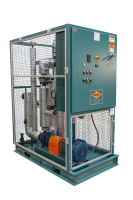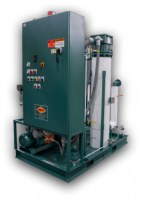Indirect Radiant Ovens
Hot oil systems are used with ovens by circulating a hot liquid through coils or plates inside the oven. A circulating fan moves air over the coils and around the oven to maintain a precise heat inside the oven unit. In addition to the fluid system, an air circulation heater, or air duct heater can be used to heat the air before supplying hot air into the oven
Industrial Ovens are used for drying, curing, cooking, and preheating many different materials
For help in sizing/manufacturing a heat transfer system for use in this application, call us at 412-276-3388
Ovens can be used in a wide variety of applications. Typical applications for ovens are drying, curing, preheating, and cooking. These applications are used in almost every industry.
The most critical information for temperature control of an oven deals with the thermal fluid flow paths. Because the oven often contains large blocks of steel, having enough fluid flow through the tools and adequate internal air circulation is crucial to a uniform temperature throughout. The diameter and number of flow paths will influence the thermal fluid system design. Some other important considerations are:
- The size and weight of the tools in the oven
- Amount of material to be heated
- Cycle time: how long the product stays in the oven
- Batch Ovens
- Continuous Ovens
- Drum Heating Ovens
- Catalytic Oxidizers
The heat systems below provide indirect temperature control of various types of ovens.
CLICK ON A SYSTEM FOR MORE INFORMATION ON DESIGN TEMPERATURES AND PRODUCT FEATURES TO MEET YOUR PROCESS REQUIREMENTSContact Our Experts
Our expert sales engineers can help you find the right custom temperature control equipment for your application.
*denotes a required field.








